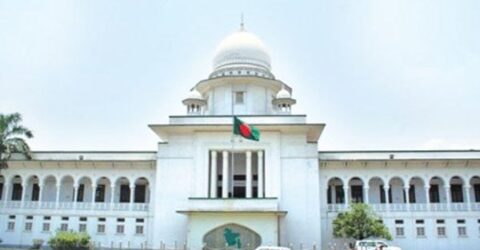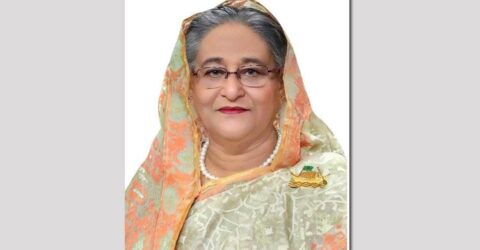
DHAKA – Prime Minister Sheikh Hasina’s ICT affairs adviser and son Sajeeb Wazed has ruled out opposition claims about the state of democracy and fears over the upcoming polls, saying none of those were true.
“They (opposition) are wrong. None of these claims are true,” he wrote in a signed article in US-based political news and polling data aggregator Real Clear Politics that carried the article on its Saturday issue.
Joy said the government opponents claimed that democracy in Bangladesh was broken, “call the 2014 general elections invalid and say the upcoming elections will be, too”.
The opponents, he said, alleged that the disappearance of some opposition leaders was a government conspiracy.
“They are wrong. None of these claims are true,” the article read.
The truth is, Joy said, the Bangladesh Nationalist Party or BNP chose to boycott the last election and thereafter “complained that too few political parties participated, resulting in a sham (and) this was a cynical ploy”.
“Blame for the imperfect 2014 election rested entirely with the BNP, not the governing Awami League party. The BNP didn’t put up a single candidate for parliament to add controversy to the elections,” the article read.
BNP, he said, actually “failed Bangladesh in 2014”.
Joy recalled that Prime Minister Sheikh Hasina repeatedly said that free and fair elections are the cornerstone of democracy and even asked the BNP to help oversee the elections while the party rejected her concessions and walked away and instead, several of its leaders chose to firebomb polling places.
BNP leaders, he said, along with members of the allied and often belligerent Jamaat-e-Islami, sparked violent protests that suppressed the vote and tore at the soul of the nation in 2014.
Joy said BNP and their collaborators set fire to thousands of homes, cars, buildings and businesses, demolished power stations, murdered 20 law enforcement officers and torched government buildings and on the election day they terrorized their political opponents with Molotov cocktails.
“Worse, the BNP appears poised to turn its back on the elections again this year. It has again threatened to stir civil unrest and violence,” Joy said.
The premier’s adviser referred to a report of US-based Human Rights Watch (HRW) which interviewed someone who said “the attackers were our neighbors from the other side of the village. They are all BNP-Jamaat”.
“They asked us not to vote. Between 9 and 11 a.m., they actually blocked the road so no one could go to the polling center. Then at 11 they began the attack,” he quoted the person as telling the HRW.
Joy said several BNP leaders were charged for their roles in the violence while as a result of their actions “the party’s (BNP) popularity dwindled to all-time lows”.
But he said as BNP-linked agitators fled prosecution, the party alleged that they had been the victims of “enforced disappearances”.
“Bangladesh police have investigated every instance of a reported disappearance,” Joy said.
Police, he said, they found no evidence of government involvement and “what they have found is that some of the ‘disappeared’ went into hiding to evade prosecution for violent crimes”.
Joy referred to the Salahuddin Ahmed’s case who was reportedly abducted by police in 2015 but “he was found two months later, hiding in India where the police quickly concluded that he concocted the entire episode in an attempt to evade justice in Bangladesh”.
“Others reappeared quickly,” Joy said, citing the instance of BNP-linked intellectual Farhad Mazhar who “was found just hours after he was reported missing on a bus travelling from the southwestern city of Khulna to the capital, Dhaka”.
The premier’s adviser, however, expected BNP to acknowledge its past mistakes and appear as a real opposition, saying this was the government hope as well.
“The government hopes that the BNP has recognized its mistakes and is willing to fight a war of ideas, not violence in 2018. Bangladesh should expect nothing less from an opposition party,” he wrote.
Joy noted that some BNP people assert that they could not do so since their leader Khaleda Zia was in jail and some commentators were demanding her release, even threatening to ‘take to the streets’ to disrupt elections if she was not freed.
“If that happened, Bangladesh would be relinquishing its hard-won adherence to the rule of law,” he said, pointing out that Zia was sentenced to five years in prison for stealing for herself more than $250,000 that was intended for the orphans’ welfare.
Joy also said 19 other charges were pending against her, five of those relating to corruption during her tenure as prime minister and were filed by an independent Anti-Corruption Commission while 14 others were related to the 2014 riots.
Joy said Khaleda Zia’s son and acting BNP Chairman Tarique Rahman also faced charges, some for embezzlement of $250,000 intended for orphans.
“In 2016, the Bangladesh High Court found Rahman guilty of money laundering, a case that included the first time a U.S. FBI agent provided evidence in a Bangladeshi court,” he said.
Moreover, Joy said, Rahman was also been charged in relation to a 2004 grenade attack on a political rally that killed 24 and injured 300, including Sheikh Hasina and “like many of the BNP’s leaders, Rahman has fled the country to avoid prosecution”.
“That absence – indeed, the absence of any one person – is no excuse for an entire party to duck the voters,” he said.
Joy added: “The BNP refused to participate in the 2014 elections and created the situation that it now decries. That irony might be lost on the international media. But it is not lost on the people of Bangladesh.”
“They (people) know better. They deserve better,” he said, concluding the write-up.




